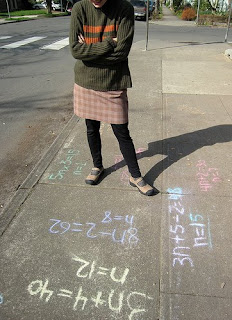 The wonderful thing about physically attending conferences is that they force you to take time to focus, Since I have been home from BLC I have been constantly busy with work and home leaving little time for reflective thinking. In the back of my mind ,however, I have been mulling over Darren Kuropatwa's presentations. BLC, as so many have said, was a wonderful opportunity to spend time with some great minds and getting to talk with and listen to Darren was certainly one of those opportunities.
The wonderful thing about physically attending conferences is that they force you to take time to focus, Since I have been home from BLC I have been constantly busy with work and home leaving little time for reflective thinking. In the back of my mind ,however, I have been mulling over Darren Kuropatwa's presentations. BLC, as so many have said, was a wonderful opportunity to spend time with some great minds and getting to talk with and listen to Darren was certainly one of those opportunities.I have read Darren's blog for over a year and I have always thought that the way he uses blogs and the creative assignments he used were great examples...But they are so much more than that.
A couple of days ago I was skimming the slides from a recent presentation by David Warlick and suddenly i understood in a much deeper way what Darren does and why it is so effective. Darren embodies what I read on the slide from David's presentation....
Stop integrating technology, and instead redefine literacy and integrate that."
When I read that I realized that not only did I agree with it but that Darren is doing just that. In his field of mathematics he has chosen to teach literacy and that in so doing he is enabling students to become mathematical thinkers who can do much more than recall content. They can construct meaning using mathematical concepts. In Darren's presentation he strove to reveal the pedagogy that facilitates this kind of learning. He is very cognizant of the need to create learning environments that are not dependent on big personalities or heavy lifters and as he walked us through his process there was great emphasis on sustainability, and scalable activities.. I encourage you to take the time to look at his slides and listen to the podcasts of his presentations. ( I think at this point only first talk is up but I am sure the others will follow soon.)
Classroom scribes shift the focus and the responsibility on to the learners. It provides an annotated record of learning and a resource that serves more than the immediate community. It allows for mentoring and the addition of expert voices beyond the traditional voice of the teacher. Darren's wiki for the Scribe Hall of Fame is open to all classrooms and all subjects that use scribes so we can both view exemplary posts and provide motivation for students to strive for excellence. Darren also described how this is student driven and how he hands over the selection process for exemplary work to the students. It is all about encouraging the students to take responsibility for their learning. I missed Darren's second talk but the third one was on assessment. It was a powerful look at assessment for mastery, and assessment of mathematical literacy. The slides with examples and rubrics are on slideshare.
Technology, be it blogs, wikis, flickr rss,or de.licio.us all play a role in Darren's classroom and as he discovers new tools he incorporated them also but not as an end but as means for him to effectively engage the students in mathematical thinking and creatively applying that thinking within the context of redefined literacies.
One of the questions that Darren asks and that we all must ask is .....What will your student's remember in 5 years? It is time for us to look seriously at the revised Bloom's taxonomy and to remember that......
"The mind is not a vessel to be filled, but a fire to be ignited' Plutarch
Photo: Sidewalk algebra http://www.flickr.com/search/?q=sidewalk+algebra&m=text
by hen power
Technorati Tags: BCL07 Kuropatwa literacy Warlick blooms classroom2.0